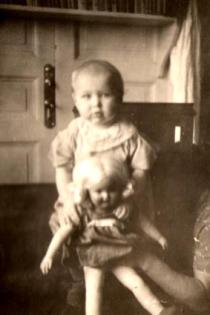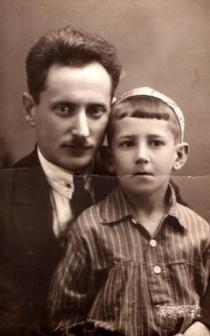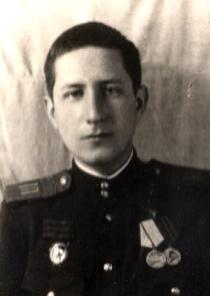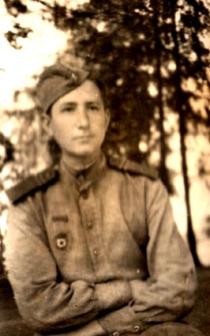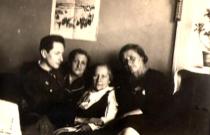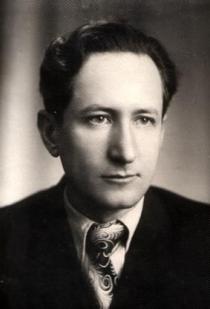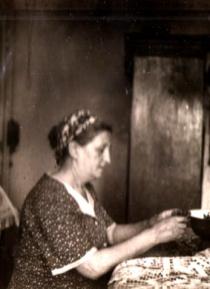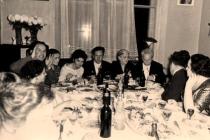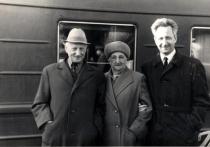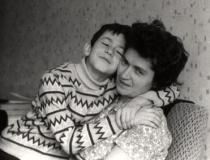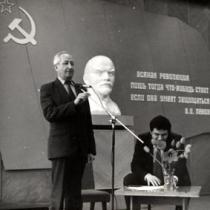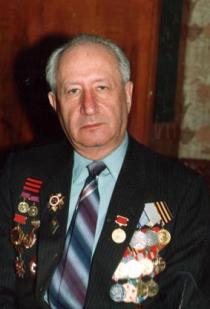This is my father Moisey Kotin and me. Father took me to the photographer and had my picture taken for the family album. The photograph was made in Moscow in 1932.
My father's family lived in a small town Kromy, Orel province in Russia [360 km to the South-East of Moscow]. There were 5 people in the family. First daughters were born. The first one was Ekaterina, Jewish name Keizlya. Then Faina, Jewish name was Fanya, Raisa, Jewish Rohl and Liya were born. Grandmother craved for a son, and in 1895 a long-awaited son was born. It was my father. Father did not live to rejoice in his son. He died in 3 days after son was born. In accordance with the Jewish tradition the son was named after his deceased father, Moisey.
Upon annulment of the pale of settlement after the Revolution in 1917, the whole family moved to Moscow. My father studied at Medicine faculty of Moscow University [M. V. Lomonosov Moscow State University, the best University in the Soviet Union, also well known abroad for its high level of education and research], and became doctor. Father became phthisiatrician and a rontgenologist.
My parents met in Moscow. After graduation father got a mandatory job assignment in the town Shenkursk, Arkhangelsk oblast [800 km to the North-East from Moscow]. Mother went with him. In 1924 father, who was specialized in phthisiology was transferred to tuberculosis sanatorium of Crimean city Yalta, [now the Crimea Republic, Ukraine, 900 km from Kiev]. I was born in Yalta in 1925. We had lived in Yalta for 2 years and father was offered a job in the sanatorium not far from Moscow to work as phthisiatrician and part-time rontgenologist. We came back to Moscow.
Then they wanted to conceal something from us they used to speak Yiddish. When we came to grandmother Hana-Mera both of my parents spoke Yiddish with her. There was a Jewish theatre in Moscow at that time and parents attended all performances. I did not know Yiddish, so parents did not take me there. We did not mark Jewish holidays at home. When I was a child my parents and I went to grandmother Hana-Mera on major Jewish holidays. She marked Jewish holidays.
I went to the kindergarten. At that time it was deemed that children should be raised in the team. We were nurtured to get used to the team since early childhood. Propaganda of the Soviet mode of life had been spread since the child was in swaddles. I remember how our child-minder in the kindergarten often asked us a question who had the happiest childhood in the world and we used to reply in chorus- soviet children in our country. And the next question was whom should we thank for it and all of us knew the reply - comrade Stalin and our communist party. It was a congenital reflex.
Soon father was assigned the chief physician of the sanatorium and he was given separate house on the territory of the sanatorium. In 1932 father was transferred to Mytischi [Moscow suburb]. He had the same position - the chief physician and rontgenologist of the tuberculosis. When I turned 7, father gave me my first camera for my birthday. It was a small box, charged with a small glass plate. I went to develop the plate in an X-ray laboratory. I walked there with bated breath not to catch tuberculosis germs.
I learned how to read and write before going to school. Father of one of the colleagues, lived in the sanatorium, where my father worked. We spent summer time there as well. He was retired and he was eager to teach us how to write and read as well as rudiments of arithmetic. Owing to those classes I entered the second grade of Russian secondary school in the year of 1934. There were other Jewish children in my class, but no anti-Semitism was coming from children or my peers. From the very childhood we were taught that all of us were USSR citizens and people of all nationalities were equal. We truly believed in that.

